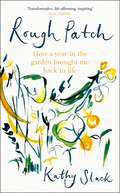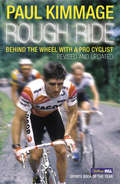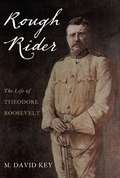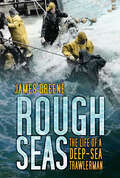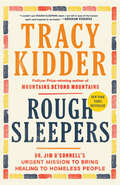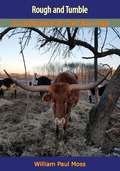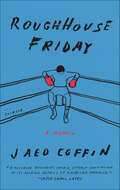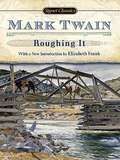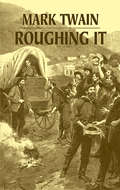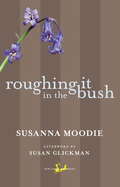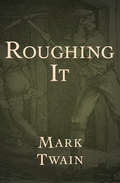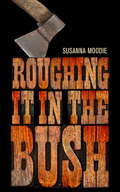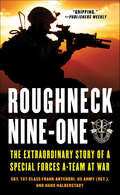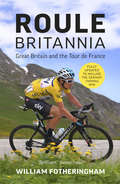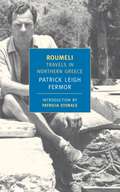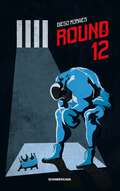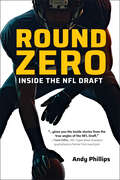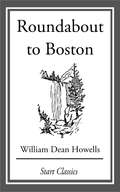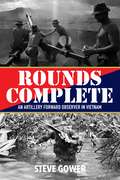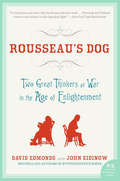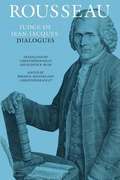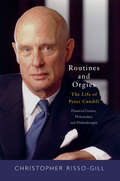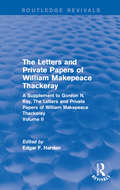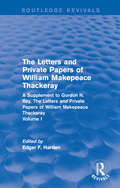- Table View
- List View
Rough Patch: How a Year in the Garden Brought Me Back to Life
by Kathy SlackWhen Kathy was forced to quit her high-flying career in London, she was a wreck - burnt out, anxious, consumed by depression. But she found solace in an unlikely place - the veg patch. She put her hands in the soil and found a way to grow, to sow some small seeds of hope.In Rough Patch, Kathy draws us into the world of the kitchen garden to reflect on the lessons she learnt from the soil, along with sharing recipes inspired by the land. Weaving together her own story of recovery with the year she spent growing and cooking her harvests, Kathy realises that the two are tightly bound together and that reconnecting with the earth could restore her hope and renew her life. Along the way there are tales of marauding pigs, transformative insights from planting leeks, recipes for an unchecked courgette glut and the discovery of why a radish seed is worth staying alive for. The result is a candid, hopeful and sometimes funny story about the healing powers of nature; a quiet manifesto for a more connected life.
Rough Ride: Behind the Wheel with a Pro Cyclist
by Paul KimmageAn eye-opening expose of and a heart-breaking lament for professional cyclingPaul Kimmage's boyhood dreams were of cycling glory: wearing the yellow jersey, cycling the Tour de France, becoming a national hero. He knew it wouldn't come easy, but he was prepared to put in the graft. The dedication paid off – he finished sixth in the World Championships as an amateur and in 1986, he turned professional.He soon discovered it wasn't about courage, training hours or how much you wanted to win. It was about gruelling defeats, total exhaustion, and drugs - drugs that would allow you to finish the race and start another day. Kimmage ultimately left the sport to write this book – profoundly honest and ground-breaking, Rough Ride broke the silence surrounding the issue of drugs in sport, and documents one man’s love for, and struggle with, the complex world of professional cycling. ‘A must read for any cyclist’ CyclistWINNER OF WILLIAM HILL SPORTS BOOK OF THE YEAR
Rough Rider
by David KeyRough Rider is a snapshot study of the significant career of President Theodore Roosevelt. Partly biographical sketch and partly analysis, the book provides an overview of his actions, ideals, and written works, highlighting important events from Roosevelt's early public life, his presidency, and later career. David Key sees Roosevel as a statesman who well understood how to create his own popular image, but equally important was Roosevelt's place as one of the foremost historians of his time, a man who understood the traditional criteria for greatness and did not hesitate to shape his own legacy. Written especially for college students, Rough Rider examines pertinent primary sources and critical analyses of other historians to aid in understanding the legacy of Theodore Roosevelt.
Rough Seas: The Life of a Deep-Sea Trawlerman
by James GreeneA trawlerman’s life was hard, often up against bad weather, rough seas and black frosts, although on calm days it was a pleasure to be at sea. In this eventful memoir, deep-sea trawlerman James Greene relates his life at sea, from his childhood when his father would take him out in some of the worst gales and hurricanes imaginable to his early career as a deckhand learner, obtaining his skipper’s ticket, and the many experiences – both disastrous and otherwise – to occur throughout his time at sea. During his career he was involved in ship collisions and fires, arrested for poaching, fired upon by Icelandic gunboats, in countless storms and even swept overboard in icy conditions off the Russian coast. The British trawling industry is largely a bygone age and people are beginning to forget the adventures, hardships and joys that characterised this most dangerous of professions. This book seeks to keep the memories of a once great industry alive.
Rough Sleepers: Dr. Jim O'Connell's Urgent Mission to Bring Healing to Homeless People
by Tracy KidderThe powerful story of an inspiring doctor who made a difference, by helping to create a program to care for Boston’s homeless community—by the Pulitzer Prize–winning, New York Times bestselling author of Mountains Beyond Mountains. <p><p> In Rough Sleepers, Kidder shows how one person can make a difference, as he tells the story of Dr. Jim O’Connell, a gifted man who invented ways to create a community of care for a city’s unhoused population, including those who sleep on the streets—the “rough sleepers.” When Jim O’Connell graduated from Harvard Medical School and was nearing the end of his residency at Massachusetts General Hospital, the chief of medicine made a proposal: Would he defer a prestigious fellowship and spend a year helping to create an organization to bring health care to homeless citizens? Jim took the job because he felt he couldn’t refuse. But that year turned into his life’s calling. <p><p>Tracy Kidder spent five years following Dr. O’Connell and his colleagues as they served their thousands of homeless patients. In this illuminating book we travel with O’Connell as he navigates the city, offering medical care, socks, soup, empathy, humor, and friendship to some of the city’s most endangered citizens. He emphasizes a style of medicine in which patients come first, joined with their providers in what he calls “a system of friends.” Much as he did with Paul Farmer in Mountains Beyond Mountains, Kidder explores how a small but dedicated group of people have changed countless lives by facing one of American society’s difficult problems instead of looking away. <p> <b>New York Times Bestseller</b>
Rough and Tumble: An Autobiography of a West Texas Judge
by William Paul MossThis is the autobiography of West Texas judge William Paul Moss, which was first published in 1954, and predominantly explores his youthful adventures on his ranches in Texas and New Mexico, where he loved to raise cattle and hunt. Judge Moss describes his life as having consisted of three parts: cattle, law, and oil. In describing his job as a judge, he portrays himself as a conscientious lawyer and judge and proclaims his love for his adopted city and state, observing that “the judge passes upon all questions of law, subject to the right of appeal to the appellate courts.” His jurisdiction included both civil and criminal matters. Though not required by law he would appoint lawyers for those who could not afford them. Moss believed that a judge should try “to make his courthouse into a temple of justice” and he believed this involved keeping his mind “on the spirit of the law rather than its technicalities.” He observed: “A country judge is, in many respects, like a country lawyer. He has to know a little bit about everything. There are times when he may not even know much about the law.”
Roughhouse Friday: A Memoir
by Jaed CoffinA beautifully crafted memoir about fathers and sons, masculinity, and the lengths we sometimes go to in order to confront our past"[A] lucidly written memoir . . . Coffin’s triumph lies in ridding the language of his father, a language that compelled him to dwell in a house he did not recognize." —Matthew Janney, The Los Angeles Review of BooksWhile lifting weights in the Seldon Jackson College gymnasium on a rainy autumn night, Jaed Coffin heard the distinctive whacking sound of sparring boxers down the hall. A year out of college, he had been biding his time as a tutor at a local high school in Sitka, Alaska, without any particular life plan. That evening, Coffin joined a ragtag boxing club. For the first time, he felt like he fit in.Coffin washed up in Alaska after a forty-day solo kayaking journey. Born to an American father and a Thai mother who had met during the Vietnam War, Coffin never felt particularly comfortable growing up in his rural Vermont town. Following his parents’ prickly divorce and a childhood spent drifting between his father’s new white family and his mother’s Thai roots, Coffin didn’t know who he was, much less what path his life should follow. His father’s notions about what it meant to be a man—formed by King Arthur legends and calcified in the military—did nothing to help. After college, he took to the road, working odd jobs and sleeping in his car before heading north. Despite feeling initially terrified, Coffin learns to fight. His coach, Victor “the Savage,” invites him to participate in the monthly Roughhouse Friday competition, where men contend for the title of best boxer in southeast Alaska. With every successive match, Coffin realizes that he isn’t just fighting for the championship belt; he is also learning to confront the anger he feels about a past he never knew how to make sense of.Deeply honest and vulnerable, Roughhouse Friday is a meditation on violence and abandonment, masculinity, and our inescapable longing for love. It suggests that sometimes the truth of what’s inside you comes only if you push yourself to the extreme.
Roughing It
by Mark Twain Hamlin HillA fascinating picture of the American frontier emerges from Twain's fictionalized recollections of his experiences prospecting for gold, speculating in timber, and writing for a succession of small Western newspapers during the 1860s.
Roughing It
by Mark TwainThese memoirs recount the writer and humorist's scuffling years, during which he beat a path across the American West and all the way to Hawaii. His spirited narrative relates a series of triumphs and misadventures and profiles a many-faceted succession of personalities and locales: the stage drivers and desperadoes of the Great Plains; Mormon society; the mines and miners of Nevada; the climate and characteristics of San Francisco; and the amusing and unexpected traits of Sandwich Island civilization. Twain finds drollery in every corner of his travels, but the sincerity and humanity of his reminiscences provide a realistic vision of now-vanished worlds.
Roughing It in the Bush
by Susanna Moodie Susan GlickmanRoughing It in The Bush chronicles Susanna Moodie's harsh and often humorous experiences homesteading in the woods of Upper Canada. A frank and fascinating account of how one woman coped, not only with a new world, but with a new self, this unabridged text continues to justify the international sensation it caused when it was first published in 1852.
Roughing It: The Authorized Uniform Edition
by Mark TwainThe Wild West as Mark Twain lived it In 1861, Mark Twain joined his older brother Orion, the newly appointed secretary of the Nevada Territory, on a stagecoach journey from Missouri to Carson City, Nevada. Planning to be gone for three months, Twain spent the next &“six or seven years&” exploring the great American frontier, from the monumental vistas of the Rocky Mountains to the lush landscapes of Hawaii. Along the way, he made and lost a theoretical fortune, danced like a kangaroo in the finest hotels of San Francisco, and came to terms with freezing to death in a snow bank—only to discover, in the light of morning, that he was fifteen steps from a comfortable inn. As a record of the &“variegated vagabondizing&” that characterized his early years—before he became a national treasure—Roughing It is an indispensable chapter in the biography of Mark Twain. It is also, a century and a half after it was first published, both a fascinating history of the American West and a laugh-out-loud good time. This ebook has been professionally proofread to ensure accuracy and readability on all devices.
Roughing it in the Bush
by Susanna MoodieRoughing It in the Bush chronicles Susanna Moodie's harsh and often humorous experiences homesteading in the woods of Upper Canada. A frank and fascinating account of how one woman coped, not only with a new world, but with a new self, this unabridged text continues to justify the international sensation it caused when it was first published in 1852. Penguin Random House Canada is proud to bring you classic works of literature in e-book form, with the highest quality production values. Find more today and rediscover books you never knew you loved.
Roughneck Nine-One: The Extraordinary Story of a Special Forces A-team at War
by Hans Halberstadt Frank AntenoriThis Iraq War memoir shares “a gritty inside look at a Special Forces team at war” and how the author’s outgunned Green Berets won a dramatic battle (Publishers Weekly).On April 6th, 2003, twenty-six Green Berets, including those of Sergeant 1st Class Frank Antenori’s Special Forces A-team (call sign Roughneck Nine-One), confronted a vastly superior force—including battle tanks and more than 150 well-trained and well-equipped soldiers—at a remote crossroads near the small village of Debecka, Iraq.Along the way, they endured a US Navy F-14 dropping a 500-pound bomb on supporting Kurdish Peshmerga fighters, the ever-present threat of WMDs, and countless other deadly obstacles.This is the never-before-told, no-holds-barred story of how one Special Forces A-team recruited and organized, trained and eventually fought—and won—a legendary conflict that will influence American military doctrine for years to come.
Roule Britannia: Great Britain and the Tour de France
by William FotheringhamHow did Great Britain conquer the Tour de France?In 2012 Bradley Wiggins made history by becoming the first Briton ever to win the Tour de France. Since that moment the UK has been living through the golden era in the world's greatest bike race, with four overall titles for Chris Froome, Geraint Thomas winning for Wales in 2018, and Manxman Mark Cavendish proving the race's most prolific sprinter. In Roule Britannia, number one bestselling author William Fotheringham, charts British cycling's rise to the top and provides us with the definitive account of the nation’s Tour de France achievements through exclusive interviews with and profiles of cycling champions - from the early days of Brian Robinson to Bradley Wiggins's dominant ride via Tom Simpson, Robert Millar, Chris Boardman and many others, Roule Britannia celebrates a nation's love affair with the greatest race of all.‘Brilliant...tells each story with passion and sensitivity’ Sunday Times
Roumeli
by Patricia Storace Patrick Leigh FermorRoumeli is not to be found on present-day maps. It is the name once given to northern Greece--stretching from the Bosporus to the Adriatic and from Macedonia to the Gulf of Corinth, a name that evokes a world where the present is inseparably bound up with the past. Roumeli describes Patrick Leigh Fermor's wanderings in and around this mysterious and yet very real region. He takes us with him among Sarakatsan shepherds, to the monasteries of Meteora and the villages of Krakora, and on a mission to track down a pair of Byron's slippers at Missolonghi. As he does, he brings to light the inherent conflicts of the Greek inheritance--the tenuous links to the classical and Byzantine heritage, the legacy of Ottoman domination--along with an underlying, even older world, traces of which Leigh Fermor finds in the hills and mountains and along stretches of barely explored coast.Roumeli is a companion volume to Patrick Leigh Fermor's famous Mani: Travels in the Southern Peloponnese.
Round 12
by Diego MoraesRound 12 es la autopsia literaria de una hazaña fenomenal. El 16 de mayo de 1977, en Estados Unidos, Alfredo, un anónimo boxeador de veintidós años oriundo del barrio Villa Española, de Montevideo, hizo realidad su sueño dorado: combatir, por el título mundial de los pesos pesados, contra el legendario Muhammad Alí. Diecisiete años después, el destino lo encuentra caído en desgracia, acusado de un crimen ominoso, preso y a la espera de un juicio en la terrible cárcel madrileña de Carabanchel. ¿Qué oscuros pensamientos atormentan al exboxeador que, enfrentado al espejo del pasado, debe someterse a un veredicto más despiadado que el de la ley: el examen de su propia conciencia? Una ficción histórica o una biografía novelada en la que Diego Moraes, utilizando las armas de la imaginación, aunque apoyado, a la vez, en una rigurosa, paciente y documentada investigación, arroja luz sobre los entretelones de una de las anécdotas más espectaculares de la vida y la trayectoria deportiva de un gran ídolo del boxeo de Uruguay y España. Jesús Quintero, Sylvester Stallone, Oscar Ringo Bonavena, Víctor Galíndez, José Manuel Urtain, Kid Tunero y Don King, entre otros, son también personajes de esta aventura maravillosa, que invita a los lectores a reflexionar sobre la fuerza de voluntad, el coraje, la dignidad, el amor y la esperanza.
Round Zero: Inside the NFL Draft
by Andy PhillipsThe must-read comprehensive inside look into the NFL Draft, football's most fascinating and integral piece of its puzzle.Millions of people watching globally, hundreds of hopeful athletes and their families on pins and needles waiting, and billion-dollar football franchises making strategic decisions--the NFL Draft is a BIG deal. Round Zero is a close look at one of sport's most thrilling procedure. As a player for the Green Bay Packers and writer for the Pro Football Hall of Fame, Andy Phillips fills Round Zero with revealing anecdotes and unexpected insights from coaches, general managers, agents, players, and more leading up to and during the Draft itself.This behind-the-scenes look aims to capture the big event beyond its grand pageantry and multi-million-dollar deals.
Roundabout to Boston
by William Dean HowellsWilliam Dean Howells (1837-1920) was an American realist author and literary critic. He wrote his first novel, Their Wedding Journey, in 1871, but his literary reputation really took off with the realist novel A Modern Instance, published in 1882, which describes the decay of a marriage. His 1885 novel The Rise of Silas Lapham is perhaps his best known, describing the rise and fall of an American entrepreneur in the paint business. His social views were also strongly reflected in the novels Annie Kilburn (1888) and A Hazard of New Fortunes (1890). While known primarily as a novelist, his short story "Editha" (1905) - included in the collection Between the Dark and the Daylight (1907) - appears in many anthologies of American literature. Howells also wrote plays, criticism, and essays about contemporary literary figures such as Ibsen, Zola, Verga, and, especially, Tolstoy, which helped establish their reputations in the United States. He also wrote critically in support of many American writers. It is perhaps in this role that he had his greatest influence.
Rounds Complete: An Artillery Forward Observer in Vietnam
by Steve GowerIn 1966, Steve Gower, a young gunner captain in the 101st Field Battery, was sent to Vietnam. He would serve in what is arguably Australia’s most controversial war in the dangerous role of forward observer with the 5th and 6th battalions of the Royal Australian Regiment. The definition of his role stated simply that he was to provide ‘timely, accurate and effective fire support’, his task to guide the guns of the Australian artillery, sited many kilometres away, in providing deadly firepower to support the soldiers who battled both the jungle and its shadowy inhabitants. Gower would learn quickly that the definition omitted to mention the terror and nerve-jangling tension of jungle warfare he was to experience as a forward observer. In Rounds Complete, Gower describes living the life of an infantry soldier, tramping the ground and joining his infantry mates in a variety of operations including search and destroy, cordon and search, heliborne and road-protection operations and company patrols from forward operating bases. He describes the inevitable boredom and monotony of the routine, contrasting this with the heightened senses of the men as they prepared to move forward with the ‘safety catch off’, the nervous anticipation of what might lie ahead, the exhilaration and, above all, the camaraderie. Gower is positive about his time in Vietnam and, perhaps surprisingly for one who saw action in this contentious war, is supportive of Australia's commitment, referring to the conflict as the last time the Army was permitted the ‘unfettered, all-arms prosecution of a war’. Rounds Complete is a frank and compelling tribute to men who served just as nobly as their AIF predecessors but, until recent times, were denied their nation’s gratitude. Their fight for understanding continues.
Rousseau's Dog: Two Great Thinkers At War in the Age of Enlightenment
by David Edmonds John EidinowIn 1766 philosopher, novelist, composer, and political provocateur Jean-Jacques Rousseau was a fugitive, decried by his enemies as a dangerous madman. Meanwhile David Hume—now recognized as the foremost philosopher in the English language—was being universally lauded as a paragon of decency. And so Rousseau came to England with his beloved dog, Sultan, and willingly took refuge with his more respected counterpart. But within months, the exile was loudly accusing his benefactor of plotting to dishonor him—which prompted a most uncharacteristically violent response from Hume. And so began a remarkable war of words and actions that ensnared many of the leading figures in British and French society, and became the talk of intellectual Europe. Rousseau's Dog is the fascinating true story of the bitter and very public quarrel that turned the Age of Enlightenment's two most influential thinkers into deadliest of foes—a most human tale of compassion, treachery, anger, and revenge; of celebrity and its price; of shameless spin; of destroyed reputations and shattered friendships.
Rousseau, Judge of Jean-Jacques: Dialogues (The Collected Writings of Rousseau #Volume 1)
by Jean-Jacques Rousseau Christopher Kelly Judith R. Bush Roger D. MastersAlthough Jean-Jacques Rousseau is a significant figure in the Western tradition, there is no standard edition of his major writings available in English. Unlike those of other thinkers of comparable stature, moreover, many of Rousseau's important works either have never been translated or have become unavailable.
Routines and Orgies
by Christopher Risso-GillPeter Cundill (1938-2011) was highly regarded as one of the greatest value investors of his time, but he was also a teacher and mentor who was generous with his knowledge and shared the wealth of his experience with many aspiring investors. He was taken with Aldous Huxley's words that the "rhythm of human life is routine punctuated by orgies," and spent his life shaking off the quotidian tasks that dulled thought and striving for the excitement of new experiences. Supported by four decades of Cundill's meticulously kept daily journals, which are intimate, frank, self-admonishing, and confessional, Routines and Orgies covers all aspects of what Cundill referred to as his "wonderful life" - commercial, artistic, romantic, and adventurous. As he would have wished, the exposure of his investment approach has been carefully continued in this biography by close friend and confidant Christopher Risso-Gill, who initially explored Cundill's professional life in There's Always Something to Do. Routines and Orgies acquaints the reader with a generous and complex man. Spanning over seventy years, and covering most corners of the globe, it is a tale of hard-won professional development and extraordinary challenges faced and survived. Although not meant to be an investment manual, those seeking perspective from an expert mind in finance will find a great deal in its pages.
Routines and Orgies: The Life of Peter Cundill, Financial Genius, Philosopher, and Philanthropist
by Christopher Risso-GillPeter Cundill (1938-2011) was highly regarded as one of the greatest value investors of his time, but he was also a teacher and mentor who was generous with his knowledge and shared the wealth of his experience with many aspiring investors. He was taken with Aldous Huxley's words that the "rhythm of human life is routine punctuated by orgies," and spent his life shaking off the quotidian tasks that dulled thought and striving for the excitement of new experiences. Supported by four decades of Cundill's meticulously kept daily journals, which are intimate, frank, self-admonishing, and confessional, Routines and Orgies covers all aspects of what Cundill referred to as his "wonderful life" - commercial, artistic, romantic, and adventurous. As he would have wished, the exposure of his investment approach has been carefully continued in this biography by close friend and confidant Christopher Risso-Gill, who initially explored Cundill's professional life in There's Always Something to Do. Routines and Orgies acquaints the reader with a generous and complex man. Spanning over seventy years, and covering most corners of the globe, it is a tale of hard-won professional development and extraordinary challenges faced and survived. Although not meant to be an investment manual, those seeking perspective from an expert mind in finance will find a great deal in its pages.
Routledge Revivals (1994): A Supplement to Gordon N. Ray, The Letters and Private Papers of William Makepeace Thackeray
by Edgar F. HardenFirst published in 1994, these two volumes are intended as a supplement to the four-volume edition edited by Gordon N. Ray in 1945-46. In writing to his broad range of correspondents, Thackeray produced a varied body of letters that will help readers to better understand his nineteenth-century society as well as his professional and private life — especially his relationships with women. These volumes contain 1713 letters: 1464 to and from Thackeray that were not included in the earlier volumes, and 249 with texts that have been edited from newly available manuscripts, and that thereby replace texts that were printed in Ray from incomplete sources.
Routledge Revivals (1994): A Supplement to Gordon N. Ray, The Letters and Private Papers of William Makepeace Thackeray
by Edgar F. HardenFirst published in 1994, these two volumes are intended as a supplement to the four-volume edition edited by Gordon N. Ray in 1945-46. In writing to his broad range of correspondents, Thackeray produced a varied body of letters that will help readers to better understand his nineteenth-century society as well as his professional and private life — especially his relationships with women. These volumes contain 1713 letters: 1464 to and from Thackeray that were not included in the earlier volumes, and 249 with texts that have been edited from newly available manuscripts, and that thereby replace texts that were printed in Ray from incomplete sources.
